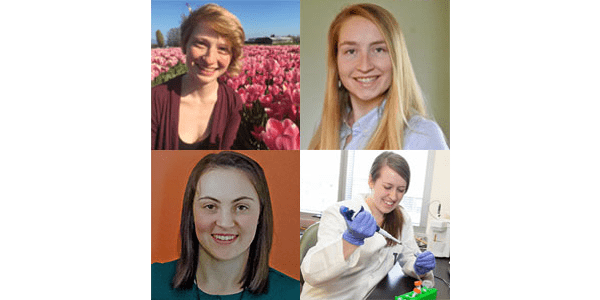Seniors Abbi Helfer and Lael Wentland, Ph.D. candidate Anna Blakney and recent Ph.D. grad Emily Krogstad have received Whitaker International Fellows and Scholars Program awards. The Whitaker International Fellows and Scholars Program sends predoctoral and postdoctoral biomedical engineers abroad to undertake self-guided projects in an academic, non-profit, policy or industry setting. The program promotes the professional development of superb leaders in biomedical engineering who will advance the profession through an international outlook.
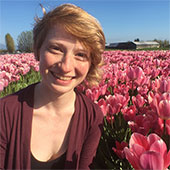 Abbi Helfer, who is currently completing her capstone in UW Rehabilitation Medicine Assistant Professor David Mack’s lab, will conduct research at the University of Queensland in Brisbane, Australia. Working with Dr. Nathan Palpant’s lab, she will investigate the stages of asymmetric patterning that occur in the first stages of embryonic development. This patterning helps form an anterior-posterior axis and left-right asymmetry, and ensures the heart’s proper structure and function. To gain further understanding of cardiovascular development, she will further develop a microfluidic system to pattern anterior-posterior and left-right axes in populations of human pluriopotent stem cells. She plans to use the microfluidic system to generate cell populations that replicate the stages of tissue development that precede the formation of a functioning human heart.
Abbi Helfer, who is currently completing her capstone in UW Rehabilitation Medicine Assistant Professor David Mack’s lab, will conduct research at the University of Queensland in Brisbane, Australia. Working with Dr. Nathan Palpant’s lab, she will investigate the stages of asymmetric patterning that occur in the first stages of embryonic development. This patterning helps form an anterior-posterior axis and left-right asymmetry, and ensures the heart’s proper structure and function. To gain further understanding of cardiovascular development, she will further develop a microfluidic system to pattern anterior-posterior and left-right axes in populations of human pluriopotent stem cells. She plans to use the microfluidic system to generate cell populations that replicate the stages of tissue development that precede the formation of a functioning human heart.
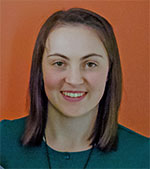
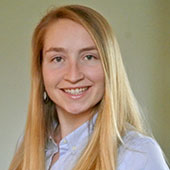 Anna Blakney, currently advised by Assistant Professor Kim Woodrow, will work with Professor Robin Shattock at Imperial College London to optimize delivery strategies of RNA replicons for HIV prevention. RNA replicons are derived from RNA viruses from which at least one gene that encodes an essential structural protein has been deleted. They show promise as a prevention strategy because they can generate high expression of a gene product like an antigen or therapeutic protein with a low initial dose. Anna will investigate RNA replicons that code for neutralizing antibodies and vaccine antigens that protect against HIV, and how different formulations and routes of administration enhance immunity.
Anna Blakney, currently advised by Assistant Professor Kim Woodrow, will work with Professor Robin Shattock at Imperial College London to optimize delivery strategies of RNA replicons for HIV prevention. RNA replicons are derived from RNA viruses from which at least one gene that encodes an essential structural protein has been deleted. They show promise as a prevention strategy because they can generate high expression of a gene product like an antigen or therapeutic protein with a low initial dose. Anna will investigate RNA replicons that code for neutralizing antibodies and vaccine antigens that protect against HIV, and how different formulations and routes of administration enhance immunity.
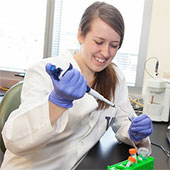 Emily Krogstad, who completed her Ph.D. in Dr. Woodrow’s lab, will be hosted by the Desmond Tutu HIV Center at the University of Cape Town in South Africa. She plans to advance early-stage development of long-acting technologies for HIV prevention. She will work with at-risk populations and health care providers to understand product attributes that influence user acceptability and delivery through the health care system. By gathering end-user feedback, Emily hopes to inform technology design in a way that will ultimately increase efficacy of the products upon reaching clinical trials.
Emily Krogstad, who completed her Ph.D. in Dr. Woodrow’s lab, will be hosted by the Desmond Tutu HIV Center at the University of Cape Town in South Africa. She plans to advance early-stage development of long-acting technologies for HIV prevention. She will work with at-risk populations and health care providers to understand product attributes that influence user acceptability and delivery through the health care system. By gathering end-user feedback, Emily hopes to inform technology design in a way that will ultimately increase efficacy of the products upon reaching clinical trials.



